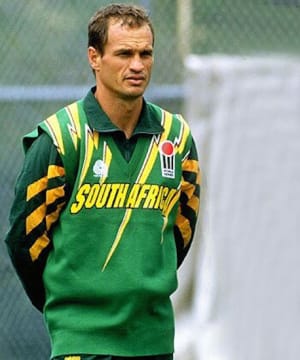
Kepler Wessels is a man with several accolades to his name. A first-class cricketer for both Australia and South Africa, commentator, umpire for the T20, first-grade coach as well as a purple belt in Brazilian Jiu jitsu. The Rebuild Health and Fitness podcast speaks to Kep and discusses how he got into the game, his career as part of the national team, his role as a coach, and the importance of setting small goals post-retirement.
Kepler's introduction to cricket
Having been born in South Africa and hailing from a family of men who were predominantly involved in rugby, Kepler's main inspiration to play cricket came from some of the international tours that were taking place in the country – since, at the time, South Africa was still competing internationally.
“From the time I was 5-6 years old, I really wanted to play cricket and pursued it all the way through. It’s interesting the way the country worked at the time; in the Afrikaans speaking community, no one played cricket, so it was pretty much an English game. While is why definitely needed those breaks throughs and eventually things sort of happened and I made my first-class debut at 16. It’s been an interesting journey from then on,” says Kepler.
Debuting at 16 this was just the beginning. With international players coming to South Africa to coach the local talent, one individual saw Kepler's potential. He explains, “I got quite lucky because they used to get English professionals to come to South Africa for summer coaching. There we had a guy who was an overseas professional so through him I got the opportunity to play for Sussex, I played in their qualifier for a season and got offered a contract which was the beginning of coming to Australia and having an international career.”
Playing for the Australian national team
During his cricketing career, Kepler played for both Australia and South Africa at different times. The start of his international career, however, can be credited to his involvement in the Sussex cricket team. He says, “I went to play for Sussex and there I got a contract to play for world series cricket. South Africa at the time was in sporting isolation, so I was sent here, and I served three-and-a-half years in qualification. I then played for about five years here in Australia.”
I’d just turned 21 when I came to Australia, I played for Waverley in Sydney, so I was already contracted by world series, but after about four games I made a few extra runs for Waverley and they were struggling to find an opener, so they just put me directly through. Later, they asked me if I wanted to stay and qualify in Australia and I really did so I jumped to that opportunity and got added to the Australian squad which was great for me. Playing for Australia that time really shaped my whole career,” he adds.
Cricket and coaching career in South Africa
After playing in England and Australia, the cricketer was given an offer to come back home, both to work and play – an offer he didn’t want to pass. He shares, “I got an offer to work, and play in South Africa while they were still in their isolation period. Six years later, Nelson Mandela was released and from Robin Island in 1991, and within a week we were on a plane to India for our first international game back.”
And what a come-back it was, not only for the South African team but also for Kepler who was finally back to playing for his country. Having dedicated the last countless years of his life to cricket, Kepler now makes use of your knowledge and experience to train young minds and bring South African talent to the forefront. But unlike other coaches, Kepler has a specific sort of approach that he follows and has a vision in mind that he aims to achieve each time he’s been in his coaching position.
“Your role as a coach is to take what the player has and make him 25% better - that’s what I think the problem is in the sporting world right now, they’re cloning everybody to try and make them do the same thing and it just doesn’t work like that.
"Another problem that we find now in coaching is that coaches who haven’t really played are trying to remain relevant by teaching things that are just outrageous. They get younger players, bluff them and these young players buy into it and this can just never be successful. My philosophy is to always keep it as simple as I can - take what the player has and try to improve what he’s got and make him successful that way."
Along with the right sort of coaching, he also makes sure to teach them a thing or two about long-term perspective. He says, “I’d rather have an obsessive approach in my players than the lazy approach. What I try to do is to create a balance and explain to them that it’s not practice that makes perfect, it’s perfect practice that makes perfect. It’s important to work on the right things for the right amount of time. I also try to give them the perspective that cricket won’t be your whole life and maybe your life will be shaped based on how successful you are and are not, but the majority of the time, cricket won’t be your life.“
You need to make peace with what you’ve achieved. If you know you’ve maximised your ability and did everything you could, you need to be proud of yourself. I think if you give players this perspective, they enjoy the sport more and become more successful,” he concludes.
Setting goals and post-retirement phase
Retirement is a given, regardless of your occupation, field, or position. Sportsmen, however, may have to face the retirement discussion earlier on in life as compared to others. Retirement doesn’t hit you until it becomes a reality – a statement even Kepler believes himself.
“Fortunately, I retired from first-class cricket at 40, but four or five years before that I knew the day was coming. I’d figured out by then that the adrenaline rush you get from performing, winning, and doing well, you’re not going to replicate that in another field. You’ll have job satisfaction, and you’ll feel good about some things that you do but that feeling of feeling up and down won’t be there anymore, so you need to be prepared for that. I started preparing five years before for that next phase of life. Most guys don’t realise that when it’s over, it’s over,” he shares.
It’s understandable that one may feel a sense of uncertainty about the future, especially post-retirement since one aspect that you spent so long focusing on has now come to an end. For this very reason, it’s super important to create small goals, and introduce yourself to habits that can keep you busy yet still make you feel alive!
“I understand although it’s tough to be able to keep going in sports like jujitsu and boxing after retirement, and you can never reach the level you could as a young man or the same level of satisfaction but I do think setting smaller goals being as good as you can be at that time and striving towards that is still pretty important because if you get to that stage where you don’t want to work on anything and don’t want to improve yourself in any way, mentally and physically you go down pretty quick,” Kepler concludes.

